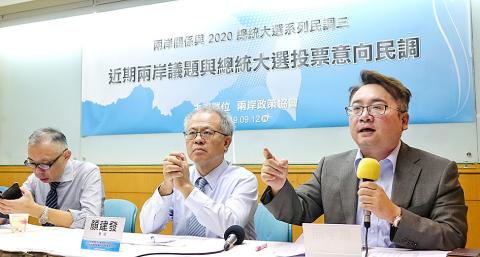President Tsai Ing-wen (蔡英文) is leading the presidential race in three hypothetical scenarios, according to a poll released yesterday by the Cross-Strait Policy Association.
Up against just Chinese Nationalist Party’s (KMT) presidential nominee, Kaohsiung Mayor Han Kuo-yu (韓國瑜), Tsai would win the election by 16.4 percent, with the two candidates claiming 50.1 percent and 33.7 percent of the vote, the poll showed.
If Hon Hai Precision Industry Co (鴻海精密) founder Terry Gou (郭台銘) joins the race, Tsai, Han and Gou would receive 38.7 percent, 26.7 percent and 23.2 percent of the vote respectively, it showed.

Photo: Liu Hsin-de, Taipei Times
Tsai would lead with 33.2 percent of the vote in a hypothetical four-way race against Han, Gou and Taipei Mayor Ko Wen-je (柯文哲), who would win 24.3 percent, 18.1 percent and 13.9 percent respectively, it added.
The poll, which was commissioned by the association and carried out by Evidence-Based Survey and Research Co (循證民調), surveyed 1,087 adults on Monday and Tuesday, with a 95 percent confidence level and a sampling error of 2.97 percent.
Respondents were also asked for their views on the four politicians’ diplomatic abilities, as well as a number of government policies.
Most (35.7 percent) believed that Tsai is the most capable of handling Taiwan-US relations, followed by Gou (18.1 percent), Han (15.0 percent) and Ko (3.7 percent), the poll showed.
Tsai would also be the best at handling Taiwan-Japan relations, 36.8 percent said, compared with Gou’s and Han’s 13.8 percent and Ko’s 6.0 percent, it showed.
Asked which of the four would be the most capable of facing down Beijing’s threat and handling cross-strait relations, 32.2 percent said Tsai, 24.1 percent said Han, 15.8 percent said Gou and 4.7 percent said Ko, it added.
Meanwhile, 42.1 percent of respondents agreed with the Mainland Affairs Council’s plan to restrict “political propaganda that endangers national security” in a proposed bill to address “agents of the Chinese Communist Party,” while 25.6 percent disagreed, the poll showed.
Fifty-five percent supported deepening military ties with the US, while 25 percent opposed when given the example of US President Donald Trump approving the sale of 66 F-16V jets to Taiwan last month, it showed.

US President Donald Trump yesterday announced sweeping "reciprocal tariffs" on US trading partners, including a 32 percent tax on goods from Taiwan that is set to take effect on Wednesday. At a Rose Garden event, Trump declared a 10 percent baseline tax on imports from all countries, with the White House saying it would take effect on Saturday. Countries with larger trade surpluses with the US would face higher duties beginning on Wednesday, including Taiwan (32 percent), China (34 percent), Japan (24 percent), South Korea (25 percent), Vietnam (46 percent) and Thailand (36 percent). Canada and Mexico, the two largest US trading

AIR SUPPORT: The Ministry of National Defense thanked the US for the delivery, adding that it was an indicator of the White House’s commitment to the Taiwan Relations Act Deputy Minister of National Defense Po Horng-huei (柏鴻輝) and Representative to the US Alexander Yui on Friday attended a delivery ceremony for the first of Taiwan’s long-awaited 66 F-16C/D Block 70 jets at a Lockheed Martin Corp factory in Greenville, South Carolina. “We are so proud to be the global home of the F-16 and to support Taiwan’s air defense capabilities,” US Representative William Timmons wrote on X, alongside a photograph of Taiwanese and US officials at the event. The F-16C/D Block 70 jets Taiwan ordered have the same capabilities as aircraft that had been upgraded to F-16Vs. The batch of Lockheed Martin

GRIDLOCK: The National Fire Agency’s Special Search and Rescue team is on standby to travel to the countries to help out with the rescue effort A powerful earthquake rocked Myanmar and neighboring Thailand yesterday, killing at least three people in Bangkok and burying dozens when a high-rise building under construction collapsed. Footage shared on social media from Myanmar’s second-largest city showed widespread destruction, raising fears that many were trapped under the rubble or killed. The magnitude 7.7 earthquake, with an epicenter near Mandalay in Myanmar, struck at midday and was followed by a strong magnitude 6.4 aftershock. The extent of death, injury and destruction — especially in Myanmar, which is embroiled in a civil war and where information is tightly controlled at the best of times —

China's military today said it began joint army, navy and rocket force exercises around Taiwan to "serve as a stern warning and powerful deterrent against Taiwanese independence," calling President William Lai (賴清德) a "parasite." The exercises come after Lai called Beijing a "foreign hostile force" last month. More than 10 Chinese military ships approached close to Taiwan's 24 nautical mile (44.4km) contiguous zone this morning and Taiwan sent its own warships to respond, two senior Taiwanese officials said. Taiwan has not yet detected any live fire by the Chinese military so far, one of the officials said. The drills took place after US Secretary